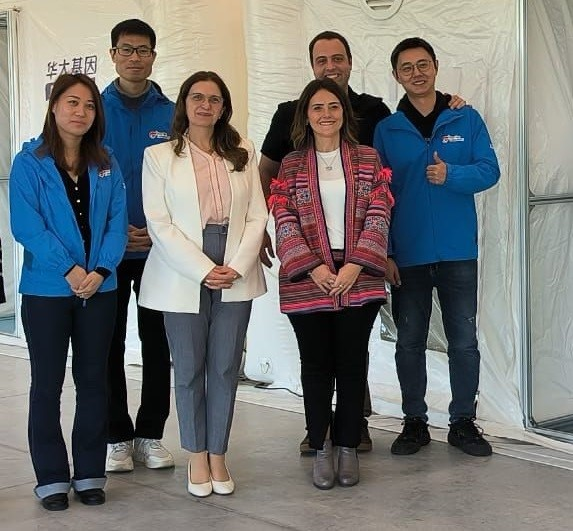BRI Pioneers Preventive Medicine in Uruguay
2023-11-26
With a smile and bounce in her step, BC. Natalia Pereiras, a clinical biochemist and laboratory director, greets us at the upcoming BGI Health Uruguay laboratory at Parque de las Ciencias, one of Uruguay's free trade zones. BGI Health Uruguay is a subsidary of BGI Genomics.
She emphasizes: "I strongly believe that preventive medicine is the way forward. BGI Genomics has a lot to offer to Latin America by bringing Next-Generation Sequencing (NGS) technology, which is cost-effective and fast. This technology can facilitate earlier diagnoses for various cancers throughout the region."
Natalia joined BGI Health Uruguay in February 2023 as director of its upcoming laboratory, recounting: "What really interested me was the challenge of developing a laboratory from scratch to meet requirements specific to Latin America, work with a multicultural team, and train in the latest healthcare technologies."
Improving regional integration, increasing trade, stimulating economic growth, and enhancing healthcare outcomes are key components of the Belt and Road Initiative (BRI). Bringing genetic technology applications from theory to reality in South America neatly aligns with the BRI spirit of international cooperation towards shared goals.
In a world-first, the company has upgraded its trademark Huo-Yan Air Laboratory from COVID-19 nucleic acid tests to cover the entire NGS end-to-end process, such as sample handing, extraction, sequencing, analysis, quality control, and report issuance in Uruguay. This Huo-Yan Air Laboratory (with seven cabins) covers over 1,000 square meters, is more efficient to deploy and maintain relative to traditional laboratories while being equipped with heating, ventilation and air conditioning (HVAC) system and other unique features to prevent inter-cabin contamination.


Natalia Pereiras (third from right) with Uruguay's Health Minister Dr. Karina Rando (third from left) in front of Huo-Yan Air Laboratory upgrade to cover the entire NGS end-to-end process
On August 2, 2023, Uruguay's Minister of Public Health, Dr. Karina Rando, visited Natalia and her team at the laboratory, expressing her satisfaction with the progress made in establishing a cutting-edge laboratory and exchanging ideas on how to leverage NGS and other advanced technologies to its full potential.
It is also worth noting that this Montevideo laboratory is located in Parque de las Ciencias, a free trade zone that is located near an airport, with the potential to receive samples from all over Latin America.
Within Latin America, Uruguay has the highest colorectal cancer (CRC) rates, with evidence suggesting that more than half of cases (54%) are detected at advanced stages. The 5-year survival rate for CRC in Uruguay is 55% (Comisión Contra el Cáncer, 2020). This is lower than the survival rate in many other developed countries, and it may be due to several factors, including lack of symptoms and lower screening rates.
With regard to enhancing Uruguay’s colorectal cancer incidence and survival rates, Natalia points to the company’s COLOTECT colorectal cancer screening test. A sample of fecal matter is taken and COLOTECT uses real-time polymerase chain reaction (PCR) to study for mutation of three genes associated with cancer, achieving 90% specificity.
COLOTECT also does not require dietary modifications or medication adjustments prior to this screening test. Patients can conveniently collect stool samples in the privacy of their own homes.
Looking ahead, the relationship between Uruguay and China is set to evolve. Pereiras envisions Uruguay serving as a bridge between Latin America and Asia, empowered by BRI, promoting multiculturalism and tangible benefits.
As laboratory director, Natalia is pivotal in achieving this shared objective. Her everyday duties include overseeing regulations, compliance with biosafety standards, and addressing doctors' questions.
To lead a 15-person cross-cultural team also brings out the collaborative side of her personality. She noted: "We made a careful selection when forming the technical team because DNA sequencing is a new technology in Uruguay and there is not much experience or training in our science-related careers. Working with individuals from different backgrounds, such as our Chinese colleagues, can be challenging yet rewarding. Going the extra mile and supporting one another motivates us to achieve our common purpose."
Natalia's story is an illustration of BRI’s ongoing influence on the continent's healthcare outcomes. Despite cultural and language differences, there is far more in common between Latin America and China, and in the words of the poet Robert Browning, "The best is yet to be."
Leonardo De Napoli conducted this interview.
About BGI Genomics
BGI Genomics, headquartered in Shenzhen China, is the world's leading integrated solutions provider of precision medicine. Our services cover more than 100 countries and regions, involving more than 2,300 medical institutions. In July 2017, as a subsidiary of BGI Group, BGI Genomics (300676.SZ) was officially listed on the Shenzhen Stock Exchange.